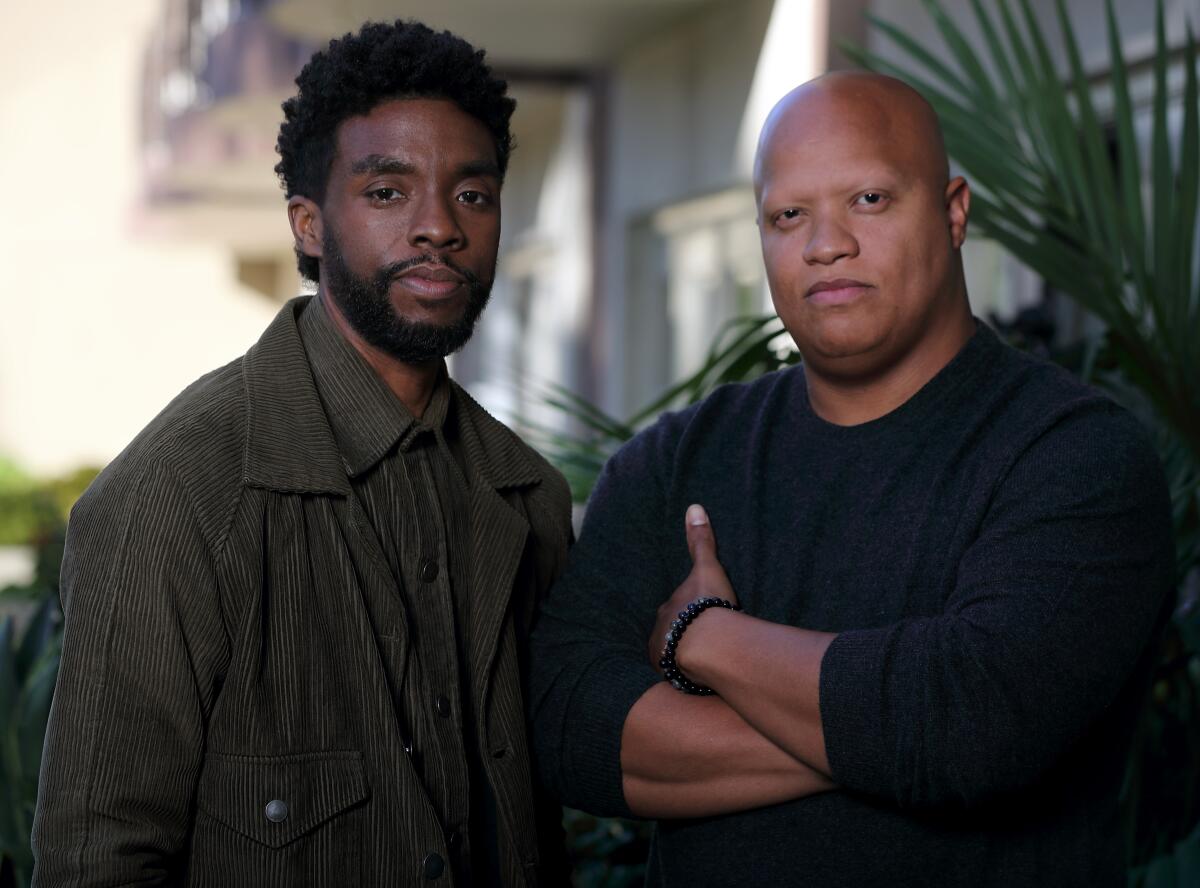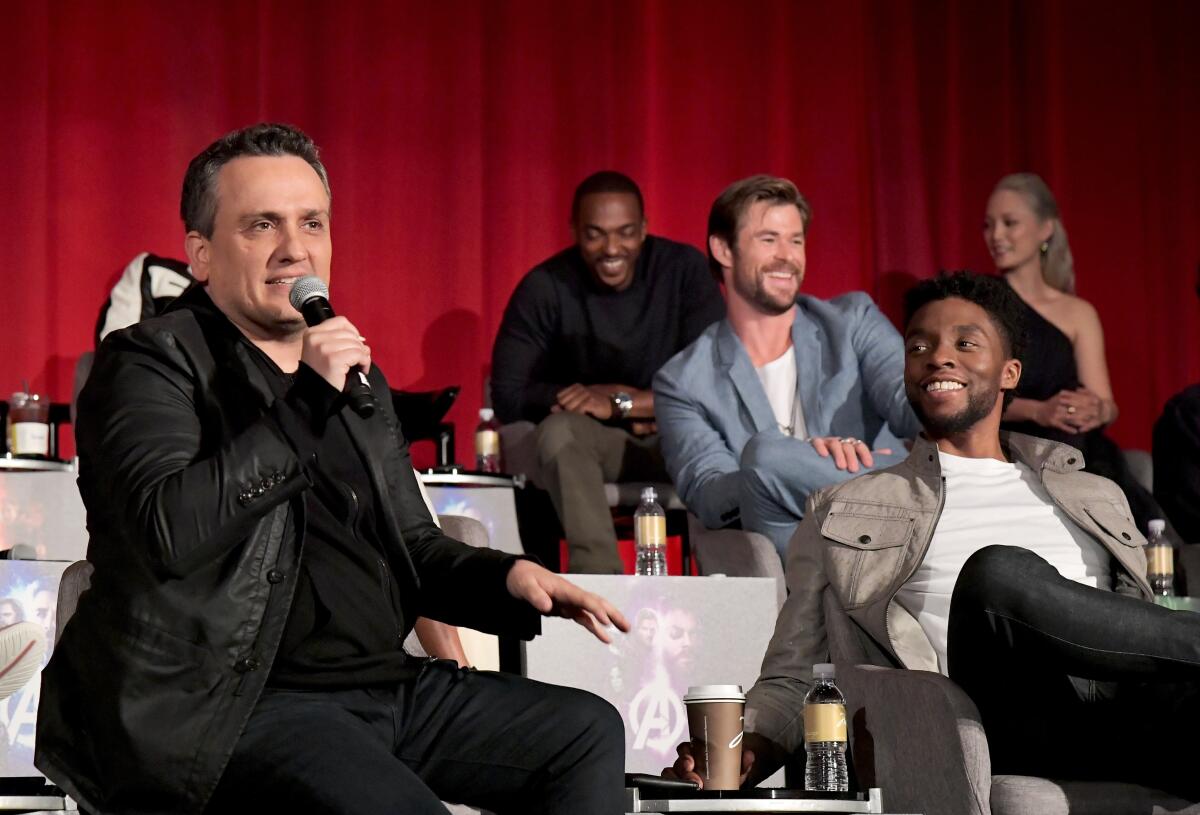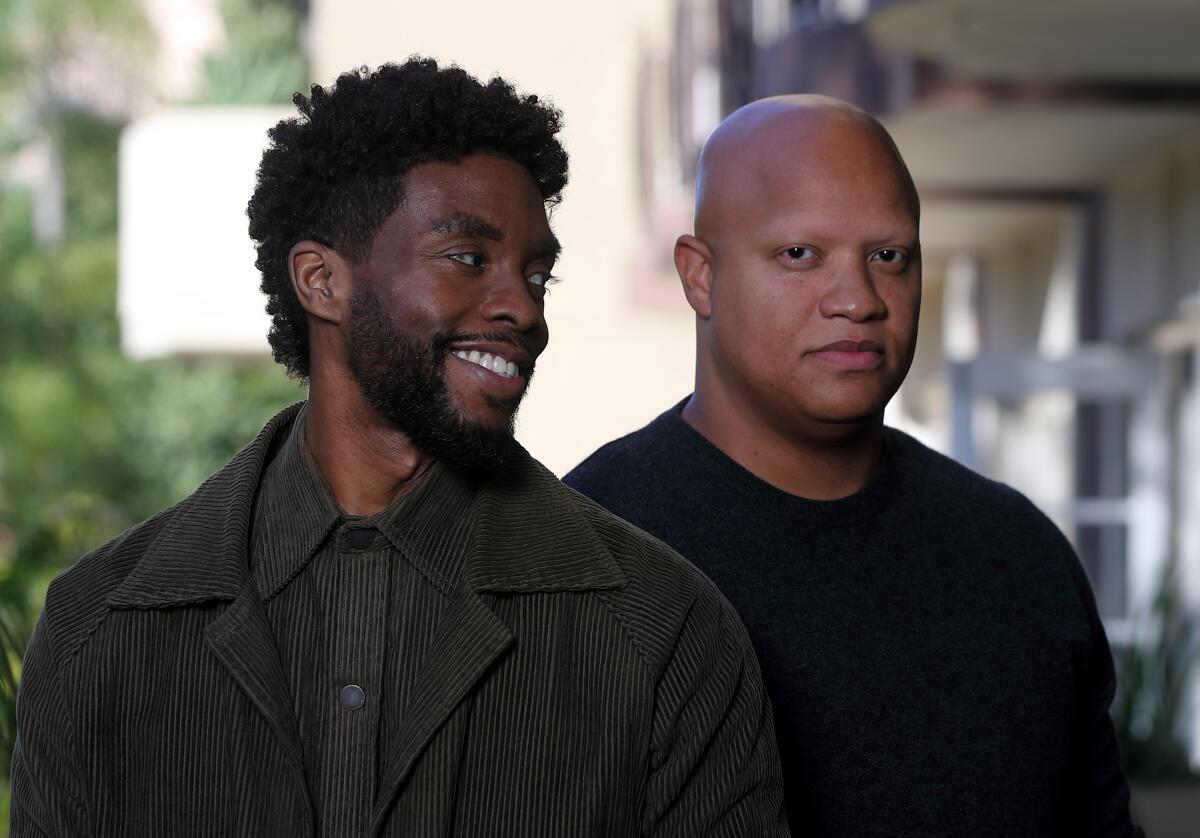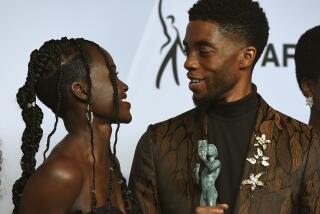How Chadwick Boseman made ’21 Bridges’ a more diverse detective story, and earned his producing stripes

- Share via
Chadwick Boseman, the chameleonic actor who has played iconic figures both real (Jackie Robinson, James Brown and Thurgood Marshall) and imagined (Prince T’Challa, a.k.a. Black Panther), is adding a new role to his arsenal: producer.
With the crime thriller “21 Bridges,” the actor earns his first official producing credit, a title he says is long overdue.
“Once you have seen the full scope of what it takes to tell a story in a collaborative process, there’s sort of this need to facilitate it,” he said in advance of the film’s Nov. 22 release. “You feel a need to help bring this thing [to life], to birth it. You’re sort of a midwife where you nurture not just your own art but other people’s. If you have a perspective or a way of mediating or solving problems, that’s really what producing is.
“Some people have that ability and they don’t get credit for it,” he added. “I would say for years I’ve been doing that and didn’t get credit for it. So right now it’s just a naming, I’m taking my credit.”
Directed by Brian Kirk, “21 Bridges” is a gritty New York drama about a detective (played by Boseman) on the hunt for a pair of cop killers. It marks Boseman’s first venture outside of the Marvel Cinematic Universe since “Black Panther” electrified the box office last year.
Joe and Anthony Russo, who worked with Boseman on three consecutive films (“Avengers: Infinity War,” “Endgame” and now “21 Bridges,” where they also serve as producers) attested to the actor’s unique dedication to the larger story.
“What we love about Chadwick is he is very creatively sophisticated,” said Joe Russo. “He’s not only an actor but he’s a filmmaker. He thinks in terms of story as much as he thinks in terms of his character. He brought a level of nuance to this character that very few actors can.”
Anthony Russo called Boseman’s range as an actor “breathtakingly dynamic.”
“He has an amazing creative instinct as an artist,” Russo said. “I think it’s fascinating watching him move through his career. I love people like him who just have this crazy original road and you can’t really predict where it’s going to go. And I think he brings the same thing to the table as a producer. He has an artistic depth to him and a soulful depth to him that is present in any project.”
Boseman says he has always been in service to the larger story being told; it’s just that now people are finally listening.
“It’s never happened that I wasn’t thinking about multiple parts of the story,” he said. “[But] they haven’t always wanted to listen or consider my opinion.
“You’ve just got to be right and consistent,” he added. “There’s plenty of times where you’re like, ‘I told them that was not going to work. And see? It didn’t work.’ And so the next time they see you, they’re like, ‘You were right about that.’”
“I think a lot of times actors have this idea that they’re giving feedback or making decisions and it’s because of their ego,” said Boseman’s producing partner Logan Coles. “It’s like, ‘I want more camera time’ or ‘I’m doing this because I want to make my character look x, y and z.’ But a lot of times with Chad, it’s about story. Like, ‘What’s the best way to tell this story?’ Not, ‘What’s the coolest thing for my character to do?’”
“And a lot of times people feel like you’re coming from the other perspective until they learn [who I am],” added Boseman. “So it’s hard to prove that [instinct] sometimes because some people are just about themselves.”
The biggest challenge in simultaneously wearing both the actor and producer hat is the multitasking and compartmentalization required to do both jobs well, Boseman says.
“There’s always going to be a moment on a film set where things are not going the way that they should be going. Whatever it is, you take on a responsibility in a way that you wouldn’t normally do as an actor when you’re trying to maintain a certain world and space of emotions and actions. You start worrying about that as opposed to what you’re supposed to be doing [in front of the camera].”
The benefit of having a producing partner, Boseman says, is that Coles is able to put out most of the fires during shooting so that he can focus his attention on delivering a convincing performance.
“But sometimes you need Chadwick Boseman to come in and say something so people listen,” said Coles. “Sometimes I’m able to convince folks and I’m able to reason with them and it works, so I’m able to shield him from that. Sometimes I’m like, ‘All right man, tell them what we agreed on, bro!’”

The Russo brothers approached Boseman about starring in “21 Bridges” at the premiere of “Infinity War.”
“In the first conversations with them and Brian Kirk, it was clear that I was producing,” said Boseman, who was immediately won over by the script but offered several amendments early on. “There just was no question.”
The script evolved mightily through the development process. Originally Boseman’s Det. Andre Davis and Stephan James’ reluctant criminal Michael were written as white and Sienna Miller’s narcotics officer was envisioned as a man.
“There were things that we knew would elevate the storytelling,” said Coles. “And we all sat in the conference room at [the Russos’ production company] AGBO and put the script on the screen and literally went page by page, line by line, word by word and really dissected it.”
“Like, how can you make a movie in this day and age about a cop who kills cop killers, and ... how do you cast that?” said Boseman. “Sometimes the storytelling happens in people’s minds without words based upon what you project on a story. So we fought for casting and for actors that brought particular sensibilities and feelings.”
“With a movie like this, I think it’s important to have an array of humanity so everybody doesn’t get painted with the same brush and everybody’s not representative of something,” said Coles. “If there’s diversity of representation you don’t feel the need to speak up [on behalf of an entire demographic]. So making those characters the gender and race that they were was intentional.”
Although it was originally due out earlier this year, “21 Bridges” now lands at a time when audiences have seen multiple narratives depicting the lives of black officers and detectives navigating an at times hostile and corrupt judicial system. The film joins the ranks of others like Sony’s “Black and Blue” and HBO’s adapted “Watchmen” series, though Boseman says his decision to make a sociopolitical statement was not premeditated.
“I’m not courting controversy,” he said. “I’m not looking for that. It’s literally just looking at a story and saying, ‘This is a good concept’ and reading it from as objective a place as I can. This feels like something I would’ve seen my favorite actors be in. This is something I can see De Niro or Tommy Lee Jones or Denzel Washington doing. This feels like that type of movie. So it’s just that. And the politics of police brutality, our conflicts with police shootings is something that becomes a part of the movie as the character deals with it.”
“If it’s not entertaining, the world’s not going to listen,” said Coles. “You’re going to navigate [the politics] as a conscious storyteller, but at the end of the day if it’s not a good film and it’s not good storytelling then the message will get lost.”

More to Read
Only good movies
Get the Indie Focus newsletter, Mark Olsen's weekly guide to the world of cinema.
You may occasionally receive promotional content from the Los Angeles Times.











